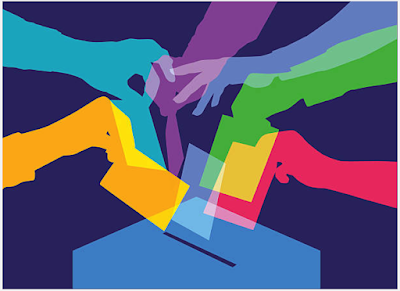 |
| Source: The League of Women Voters |
By Sam Piha
Did you know that in many states young people can pre-register to vote at the age of 16-17? Student organizers and adult volunteers work collaboratively with schools, organizations and events to coordinate voter registration drives that target high school and college students. To learn more about organizing voter registration drive, click here. You can also share a video by young people on voter registration drives by clicking on the image below.
Bring Voter Registration to Your High School
“High schools are the most efficient and equitable system we have for getting young people registered, particularly the 40% who do not attend college.” [i]
 |
| Source: Ed Week |
Paper and online registration drives can occur during classes, lunch periods, school assemblies, school orientation days, school club days, marches, etc. After students register, they are challenged to recruit other youth to register and/or to organize new registration drives and are encouraged to vote in every election. To learn more and access a guide for organizing a registration drive, click here.”
“The Civics Center is a nonpartisan, nonprofit organization that empowers high school students to hold peer-to-peer voter registration events in their high schools. When students invite their peers into the democratic process, they build civic engagement, develop leadership skills and strengthen our democracy. We are committed to nonpartisanship and an inclusive spirit of voter registration. We also prioritize collaboration with school faculty and administration as well as local election officials.”“We registered 103 students in 2.5 hours at one high school with the help of a student League member who attends the school and a social studies teacher and his students.” [ii] - member of the League of Women Voters of Henderson County (NC)
Here are the process students will use to organize a voter registration event in your school:
1. Attend a 45-minute online workshop held by The Civics Center which outlines the importance of youth voter registration, the process of planning an event in your school, and how to register to vote and help others to register in your state. Find a workshop for your state on our website.
2. Gather volunteers from a club, honors society, class, or group of friends.
“I organized a registration drive at my school all by myself. It wasn’t the best time of the year due to AP testing, but I was able to register 99 of my classmates. I also volunteered at other schools’ registration drives. I think we need to get a lot of young adults voting because then if politicians want to be re-elected, they will have to advocate for our views.” [iii] – Michael, high school student
3. Coordinate with the school administration to pick one or more dates, times, and locations to hold a voter registration event. Voter registration is usually conducted either with tables and clipboards during a lunch period, or through student-led presentations in a homeroom, advisory, or class period.
4. Register your school on The Civics Center’s website listing an estimated date for the planned event and the name and email of a faculty sponsor.
5. Receive a toolkit, Democracy in a Box, free from The Civics Center before the event. Democracy in a Box is a starter kit that includes pens, clipboards, stickers, posters, candy, and more supplies to help make your event as easy as possible and fun for participants. We ship Democracy in a Box to the designated faculty sponsor to promote effective collaboration within the school.
6. Acquire voter registration forms. We go over this process in the webinar training; in many states, this is as simple as printing a PDF. In some states, it’s simpler to use online voter registration.
7. Hold the voter registration event on the selected date(s) using the materials in Democracy in a Box, and report back the number of registrations to The Civics Center via email.
8. Return the completed voter registration forms to your local elections official within 2-3 days of the event.” [iv]
“We plan to host registration events, and possibly even parties; on election day, we plan to go with teens who are voting for the first time and to make a big deal of it (e.g., ‘It’s my first-time voting’ hats or sashes).” – Rebecca Fabiano, Executive Director, FAB Youth Philly
NOTE: After registration, a Get Out the Vote campaign can begin. Students are reminded about upcoming candidate forums and elections. Youth are also encouraged to create social events such as Flash Mob Voting (meeting at one location and marching to a post office with mail-in ballots) and election night watch parties.
[i] The Civics Center, Our Purpose
[ii] League of Women Voters, The League Empowers Teens Through Youth Voter Registration Programs
[iii] Youth Voter Movement, About the Movement
[iv] The Civics Center, Bringing Voter Registration to Your High School











